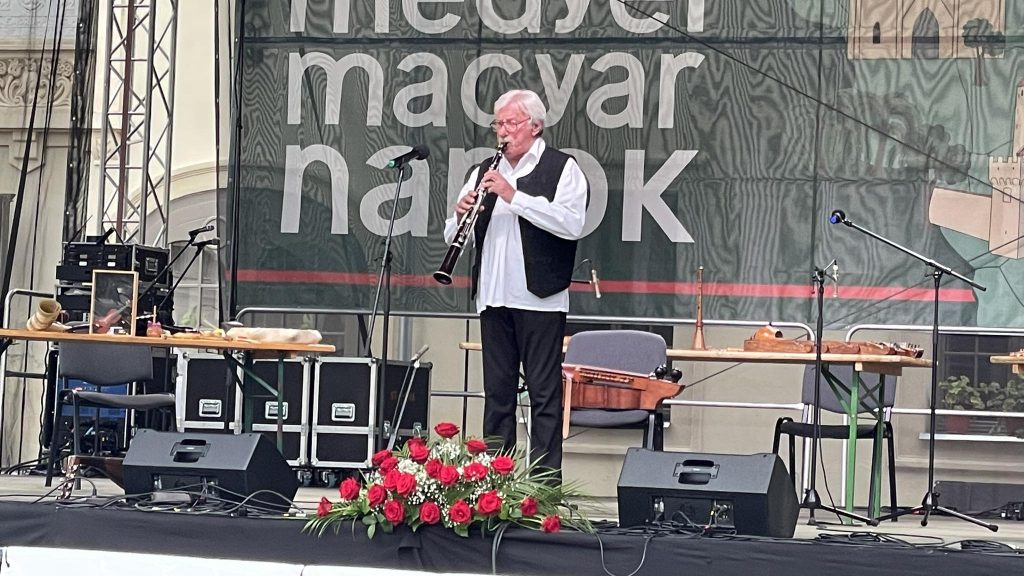On the occasion of the state awards on August 20, this year, the Kecskemét living artist who performs with a unique quartet in the world received the Knight's Cross of the Hungarian Order of Merit. By the way, he plowed the lawn during Covid, and now supplies his entire family with vegetables and fruits.
The award went to Sándor Szabó for his sacrificial work in order to preserve the traditions of the art of tárogató, and in recognition of his outstanding musical activity. Music and tárátógát have always played a central role in his life, even when he was the editor-in-chief of a television station or working on assignment in Romania.
First of all, I was very moved, you work to bring joy to your audience and feel good yourself, because being a music lover, you can only do this from a pure heart and joy. The satisfaction of the audience is my award, so it was really good, I even got a little embarrassed
Sándor recalled when he received the state award. The musician grew up in Dunapataj, then moved to Szeged to study clarinet at the music conservatory.
There was an uncle who lived in my hometown, who was a tinkerer, and when I was young, he once gave me the instrument to try it out and play a little, because this instrument is a miracle. This is the voice of the Hungarian soul. I was already working as a music teacher, when Uncle Józsi Nagy, who played the tárogato, came over to me back home in Pataj and gave me his instrument because, as he said, he can't play it very well anymore and it's an instrument that if you don't play it, it'll get ruined. Well blow my son to stay alive
- said Sándor Szabó, who took the elderly musician's advice and started playing the instrument seriously, while he taught music and had several choirs in the famous city and was also a member of the Kecskemét theater orchestra for 30 years.
The tárogató is the companion of Hungarian history from the conquest to the present day. Over the centuries, the instrument's structure, sound, and timbre have undergone minor and major changes. The tárogató became particularly popular during the Turkish subjugation, in the 16th century. The soldiers of Végvár were happy to make fun of him, but his voice was also heard in various noblemen's courts and weddings.
The tárógató was a valued instrument during the Rákóczi War of Independence. His sharp voice conveyed orders to the soldiers, and at other times it was an indispensable accompaniment to camp songs and dances. The present form of the tárogátó was created in the 19th century. at the end of the year in Budapest at the Schunda and Stowasser instrument factories. Compared to the historical reeds, the body of the instrument was enlarged, it was played with a clarinet-like mouthpiece, and over the years it was equipped with more and more keys. The flute rose to the rank of classical instruments. The tárogató is considered a Hungarian musical instrument all over the world. They play historical music, folk music, classical and jazz music.
Sándor Szabó not only worked as a music teacher, he was also a journalist and marketing specialist for decades. He worked at Kecskemét TV as an editor for five years and then as editor-in-chief for ten years, from where he moved to Fornetti, from where he retired as a marketing manager.
Whatever I did, I always stayed close to music, I worked as a music teacher, I was also a member of the teacher's choir, we made a clarinet and saxophone quartet, I also played in the Kecskemét big band, but life took me in another direction. When I became the director of the newly formed Romanian branch of the bakery company, I gave clarinet lessons as part of social work at the Dr. Imre Palló Art Lyceum in Székelyudvarhely at the request of the director, because, as he said, there was not a single clarinet teacher to be found within a 100-kilometer radius.
- said Sándor Szabó, who spends his retirement years actively playing music, as we found out, he is invited to perform in many places both here and beyond the border.
We also have a string quartet, which is unique in the world, as we play four instruments of different sizes in the ensemble. When this reformer was born in 1897, the Strasser company produced the most common soprano reeds as well as alto, tenor and baritone reeds, practically in the same way as it did with the saxophone family.
There are only a few copies of these larger instruments left in the world, and an instrument maker from Baja undertook to make copies of them and Sándor Szabó's band plays on these instruments.
The name of our ensemble is Gregus Tárogató Együttes, because we took the name of our instrument maker.
This quartet is the only one in the world to play music in this way, where the works are arranged by Sándor Szabó and they perform at concerts with serious fellow musicians. The first conductor is Eszter Palotás-Tóth, who is a saxophone artist, the alto conductor is clarinet teacher László Andrási, and the tenor conductor is an engineer, Gábor Csuvár.
And have you ever heard of a hospital that has its own women's choir? Sándor Szabó conducts the Medrigal choir of the Kecskemét hospital.
And if he still has free time after all this, he spends every minute of it on his son's farm, because Sándor also started farming with his wife. We found out that they started to cultivate the area during the Covid period and today they maintain that they can produce almost everything for the kitchen on the approximately 1,000 square meter plot.
Since my father worked in agriculture, I was no stranger to the garden. My wife retired as a high school teacher, and her grandparents were farmers, so we've both had a spade and a hoe before.
Vegetables are grown for the kitchen, carrots, turnips, potatoes, zucchini, squash, green beans, green peas, peppers, tomatoes, and 18 fruit trees have also been planted, which have already turned into fruit, there are autumn and apricots, cherries, cherries, walnuts, pears, plums, apples. and forty bushels of table grapes. They can provide for the family and there will be sauces and soups for the winter, there are already almost 40 liters of tomato juice in the pantry.
I look for the flavors of my childhood in everything, I find it in the parsley I grow myself or in peaches, for example. When we sat on the veranda as children shirtless and the peach juice was dripping on our elbows, well, I have now managed to bring back this taste with my peaches
– like the musician, who emphasized that it is a very important aspect to know what we eat and he always takes care of the plants so that they are healthy food.












